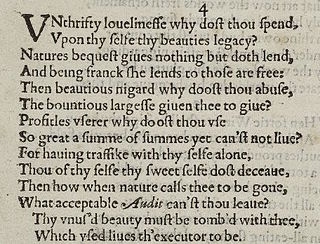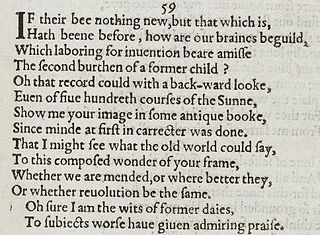
Stephen Jay Greenblatt is an American literary historian and author. He has served as the John Cogan University Professor of the Humanities at Harvard University since 2000. Greenblatt is the general editor of The Norton Shakespeare (2015) and the general editor and a contributor to The Norton Anthology of English Literature.
Stephen Booth was a professor of English literature at the University of California, Berkeley. He was a leading Shakespearean scholar.
Sir Andrew Jonathan Bate, is a British academic, biographer, critic, broadcaster, scholar, and occasional novelist, playwright and poet. He specializes in Shakespeare, Romanticism and ecocriticism. He is Regents Professor of Literature and Foundation Professor of Environmental Humanities in a joint appointment in the Department of English in The College of Liberal Arts and Sciences and the School of Sustainability in the Global Futures Laboratory at Arizona State University, as well as a Senior Research Fellow at Worcester College, Oxford, where he holds the title of Professor of English Literature. Bate was Provost of Worcester College from 2011 to 2019. From 2017 to 2019 he was Gresham Professor of Rhetoric in the City of London. He was knighted in 2015 for services to literary scholarship and higher education. He is also Chair of the Hawthornden Foundation.

William Shakespeare's sexuality has been the subject of frequent debates. It is known from public records that he married Anne Hathaway and had three children with her; scholars have examined their relationship through documents, and particularly through the bequests to her in his will. Some historians have speculated Shakespeare had affairs with other women, based on contemporaries' written anecdotes of such affairs and sometimes on the "Dark Lady" figure in his sonnets. Some scholars have argued he was bisexual, based on analysis of the sonnets; many, including Sonnet 18, are love poems addressed to a man, and contain puns relating to homosexuality. Whereas, other scholars criticized this view stating that these passages are referring to intense platonic friendship, rather than sexual love. Another explanation is that the poems are not autobiographical but fiction, another of Shakespeare's "dramatic characterization[s]", so that the narrator of the sonnets should not be presumed to be Shakespeare himself.

Anthony Joseph FRSL is a British/Trinidadian poet, novelist, musician and academic. In 2023, he was awarded the T. S. Eliot Prize for his book Sonnets for Albert.

Sonnet 4 is one of 154 sonnets written by the English playwright and poet William Shakespeare. It is a procreation sonnet within the Fair Youth sequence.

Sonnet 55 is one of the 154 sonnets published in 1609 by the English playwright and poet William Shakespeare. It is included in what is referred to as the Fair Youth sequence.
David Lee Miller is a scholar of English Renaissance Literature. He is Distinguished Professor of English and Comparative Literature at the University of South Carolina in Columbia. His works include The Poem's Two Bodies: The Poetics of the 1590 Faerie Queen, ; Dreams of the Burning Child: Sacrificial Sons and the Father's Witness ; three edited books; and about two dozen refereed articles that have appeared in scholarly journals such as Modern Language Quarterly, English Literary History, and Publications of the Modern Language Association. He is one of four general editors of The Collected Works of Edmund Spenser, a new scholarly edition under contract to Oxford University Press.

Sonnet 54 is one of 154 sonnets published in 1609 by the English playwright and poet William Shakespeare. It is considered one of the Fair Youth sequence. This sonnet is a continuation of the theme of inner substance versus outward show by noting the distinction between roses and canker blooms; only roses can preserve their inner essence by being distilled into perfume. The young man's essence or substance can be preserved by verse.

Sonnet 59 is one of 154 sonnets written by the English playwright and poet William Shakespeare. It's a part of the Fair Youth sequence, in which the poet expresses his love towards a young man.

Sonnet 63 is one of 154 sonnets published in 1609 by the English playwright and poet William Shakespeare. It is one of the Fair Youth sequence. Contrary to most of the other poems in the Fair Youth sequence, in Sonnets 63 to 68 there is no explicit addressee, and the second person pronoun is not used anywhere in sonnets 63 to 68.

Sonnet 72 is one of 154 sonnets published by the English playwright and poet William Shakespeare in 1609. It is one of the Fair Youth Sequence, which includes Sonnet 1 through Sonnet 126.
Kimberly Johnson is an American poet and Renaissance scholar.
Shakespeare's 77th sonnet is the half-way point of the book of 154 sonnets. The poet here presents the idea of the young man taking on the role of poet and writing about himself. This sonnet makes use of the rhetorical device termed correlatio, which involves a listing and correlating of significant objects, and which was perhaps overused in English sonnets. The objects here are a mirror, a time piece and a notebook, each representing a way towards self-improvement for the young man as poet.
Sonnet 101 is one of 154 sonnets written by the English playwright and poet William Shakespeare. It is a member of the Fair Youth sequence, in which the poet expresses his love towards a young man. The three other internal sequences include the procreation sonnets (1–17), the Rival Poet sequence (78–86) and the Dark Lady sequence (127–154). While the exact date of composition of Sonnet 101 is unknown, scholars generally agree that the group of Sonnets 61–103 was written mainly in the first half of the 1590s and was not revised before being published with the complete sequence of sonnets in the 1609 Quarto.

Jay Clayton is an American literary critic who is known for his work on the relationship between nineteenth-century culture and postmodernism. He has published influential works on Romanticism and the novel, Neo-Victorian literature, steampunk, hypertext fiction, online games, contemporary American fiction, technology in literature, and genetics in literature and film. He is the William R. Kenan, Jr. Professor of English and director of the Curb Center for Art, Enterprise, and Public Policy at Vanderbilt University.
Carla Mazzio is an American literary and cultural critic. She specializes in early modern literature in relationship to the history of science, medicine, and health, the history of language, media technologies, and the printed book, and the history of speech pathologies with a focus on the harmful social construction of the “inarticulate” person or community. Her research has been supported by the Guggenheim Foundation, the National Endowment for the Humanities, and the Radcliffe Institute for Advanced Study at Harvard University.
Lorna Margaret Hutson, FBA is the ninth Merton Professor of English Literature and a fellow of Merton College, Oxford. Together with Professor John Hudson, she is a director of the Centre for Medieval and Early Modern Law and Literature at the University of St Andrews.
Jeffrey A. Masten is an American academic specializing in Renaissance English literature and culture and the history of sexuality. He is the author and editor of numerous books and scholarly articles. Masten's book Queer Philologies was awarded the 2018 Elizabeth Dietz Prize for the best book in the field of early modern drama by the journal SEL: Studies in English Literature 1500–1900. He was named a Guggenheim Fellow in English Literature for 2022.
Julia Reinhard Lupton is an American scholar of William Shakespeare and renaissance literature. She is a professor of English at the University of California, Irvine and received a Guggenheim Fellowship for her scholarship.










